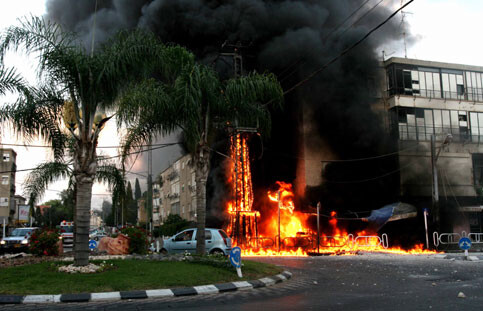Jerusalem 17 July 2006

Flames are seen after a Katyusha Rocket slammed into a building in the northern costal town of Nahariya 13 July 2006. (MaanImages/Moti Milrod)
Here, we all feel like the boxer Roberto Duran, who was known as “The Hands of Stone.” In a rematch fight with Sugar Ray Leonard in New Orleans in 1980, after having defeated the American gold medalist during the ‘Brawl of Montreal’, he turned his back to the ring in the eighth round, let his hands fall and uttered the immortal words, “No Mas, No Mas.”
No More. No More.
People were hiding in bomb shelters or trying to find a way out of town yesterday as Hezbollah rockets rained down on Haifa. I couldn’t sleep all night; every noise sounded like a rocket landing. They came in like pop flies and you could hear the thwapping as they landed in the distance. As I jumped in to the shower at 9:00, something hit hard in Haifa near the water. The sirens went off and the streets became deserted. Thursday nights hit had only engendered a kind of black comedy amongst the residents - this time it was real.
Eight dead in a rail maintenance yard.
By Monday, more rockets were landing in northern Israel. The rules of the game had instantly changed. For most Israelis, Gaza was far away and they could go
about their summer as per usual. But this time, daily life was disrupted for the first time in a major Israeli city since tensions had escalated.
At least 140 Lebanese civilians have also died since the violence broke out last week and public infrastructure like the airport and roads has been mercilessly demolished.
As ‘Operation Summer Rain’ had lulled the Israeli populace in to a state of soporific complacency where the narrative of returning a soldier justified an
intrusive bombardment of Gaza which largely killed civilians, the latest escalation had only emboldened them in to believing that the devastation of Lebanon is justified for ‘security purposes’ - a catchall phrase designed to give the military carte blanche discretion to carry out its idea of the public
interest.
In other words, the narrative here is built around the idea that the voices who are calling the Israeli response counter-productive and disproportionate are
naive peaceniks who do not understand the value of sending Hezbollah a blunt and straightforward message.
Or, in the words of the macho new Israeli Defense Minister, “They’ll never forget the name Amir Peretz.”
The irony is not lost that Peretz, the darling of Israel’s left, is an Arab Jew and that President Moshe Katsav, currently fighting off sexual harassment
allegations, is an Iranian Jew. The head of state and the Defense Minister who are authorizing the attacks are an Iranian and an Arab in a Jewish state - such are the contradictions of this place. Nothing is as it seems.
Whoever is the talking head in Israel representing the government is irrelevant; everyone here knows that the military’s actually in charge right now.
In what could only be called a deeply hypocritical and backhanded response, UN Secretary General Kofi Annan and UK Prime Minister Tony Blair called for an international force to be sent to Lebanon to stop attacks on Israel. What about Israel’s bombardment of Gaza? What about Israel’s decimation of Lebanon? Why hasn’t the UN called for the same type of international force in Gaza or the West Bank? Civilian casualties in both those places are far greater than what Israel has endured during the rocket attacks. Does the relative military power of a state make it above being censured for its own aggression and policies which violate international law?
This is an open question.
Let it not be forgotten that Israeli military capacity has been realized by direct and indirect US and European Union support. Israel is a proxy representative of the West in the Middle East, which would explain the wide berth and discretion it is given in the exercise of its foreign policy, even when it violates international law. When was the last time the European Union cited the human rights component of its favorable trade agreement with Israel?
Tony Blair was the evil genius who flew to Iraq in an off-blue button down shirt with sleeves rolled up, to read a children’s book to Iraqi elementary school students towards the end of the Hutton Inquiry in 2003, promising them that big bad Saddam would never come back. Though the weapons inspector David Kelley was dead after being pressured to ‘sex up’ the dossier, everybody loved Tony back home for the sheer quality of the PR stunt. After all, he had beaten those mean Iraqis, made the world safer from terrorism and stopped the acquisition of nuclear weapons by a rogue power.

Israeli Defense Minister Amir Peretz (C), visits Israelis in a bomb shelter in the Israeli northern coastal town of Nahariya 17 July 2006. (MaanImages/Moti Milrod)
If there was any doubt that the G8 and the West in general are setting the rules of the game in international relations, there should now be no question at all on the matter.
Hezbollah, intending to send a message about the Gaza incursion, clearly overstepped in its resistance activities. They will now pay a heavy price.
Hezbollah leader Hassan Nasrallah is permanently damaged by this and will become an assassination target. The West has already portrayed him as just another rabid, frothy-mouthed Arab terrorist just like Osama Bin Laden - largely because that’s what he is.
By firing hundreds of missiles in to northern Israel in an unprecedented way, Israel utilized its strategic opening to carry out a massive assault that had been talked about since the original withdrawal from Lebanon. Hezbollah has now also eroded the good will of the Lebanese population as well. Ariel Sharon had known about the proliferation of rockets in southern Lebanon from Iran and had military plans drawn up early on when he was Prime Minister.
There is a dearth of wisdom in the Holy Land, but no shortage of naive machismo and empty threats. Everyone I know here is tired of all this fighting. They say life is too short to live like this - maybe it’s time to move away. Even the Old City in Jerusalem has Israeli helicopters circling overhead right now. Everyone’s on edge.
But what about the occupation in the West Bank, East Jerusalem and Gaza? Will it go on for another ten years in the name of maintaining security? What about the Separation Wall that separates families? It seems that at no other point in history has security been so effectively used to violate basic human and civil rights.
The only difference between the actions of Israel’s military and the terrorism of Hezbollah is that Israel’s is state sanctioned. In either scenario, innocent civilians inordinately pay the price of this aggression whether it is Israel, Hezbollah or a sectarian faction connected to Hamas. Iran and the US simply prime the pump by providing resources and weaponry in this proxy Middle East war.
There is something more ominous in the background of this story, though. The US has never been comfortable that they have had to accommodate an Iran which has been punching above their weight class while the Americans have been busy in other places defending freedom, mom’s apple pie and all those other great things. As the US has become entrenched in Iraq, Mahmoud Ahmadinejad has openly chastised US intentions in the region in an inflammatory manner. There has been talk of pre-emptive strikes against Iran since the fall of 2003.
For extreme hawks in the US Administration such as Dick Cheney and Donald Rumsfeld, they now have a strategic opening to bend the ear of George W. Bush. There are many within the Pentagon who would support a deep aerial assault on Iran, not only on potential nuclear reactors, but against the military and logistical infrastructure of Iran which is perceived as the immediate threat. Those who hold this position would argue that the casualties which would result from Iranian rocket fire in to Iraq at American soldiers and Iran’s wide accessibility to launch terrorist activities on a global scale, would be worth the risk of permanently damaging the vital miltary, transportation and communications infrastructure of the Islamic state.
Iran is clearly a nation that jeopardizes American interests and in the current power equation, the US is certainly not beyond launching a pre-emptive strike. Even US concerns about rising oil prices in the event of an attack on Iran could be addressed by opening up the Strategic Petroleum Reserve for a period of time.
Syria is widely perceived as irrelevant and could be handled by the Israeli military, according to this view. The US would then call on NATO and individual countries within the European Union to support the attacks without ever having to resort to a ground war.
The US, by viewing the Israeli/Palestinian conflict as a regional issue, has never effectively played the role of a balanced arbiter due to its own energy and geo-political interests in the region. In fact, in 1953, such American stalwarts with names like Schwartzkopf and Roosevelt helped overthrow a
democratically elected nationalist leader to install the Shah in Iran after oil fields belonging to British Petroleum were nationalized. It was the first ever
CIA-led coup. The Americans and the British are old hands at this.
The US’s Middle East democracy project was never well thought out and has been a sad series of failures - they would have been better off cloning a bunch of Mubaraks in the region rather than imposing a kind of Rococo democracy composed of quisling leaders.
Make no mistake - we have now collectively crossed the Rubicon into dangerous times. The question is not if there is going to be a war with Iran but when.
Related Links
Am Johal is a freelance writer from Vancouver, Canada who worked during 2004 in international advocacy with the Mossawa Center, the Advocacy Center for Arab Citizens of Israel


